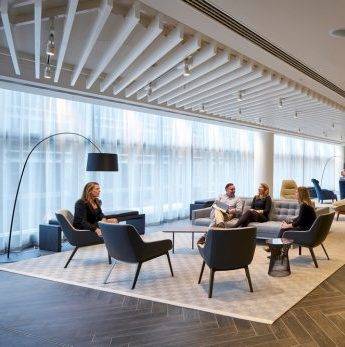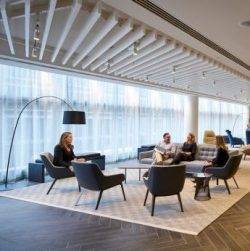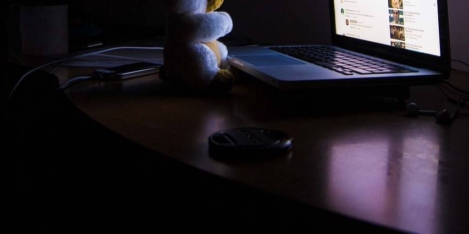June 15, 2018
Four key points to consider when creating a digital workplace
 As the use of digital technologies and data to create new value propositions and operating models becomes more commonplace, workplaces across the world are being affected across sectors, from manufacturing to local government. Almost all areas have been touched by the megatrend, whether from own initiatives or to keep up with competitors. However, Arthur D. Little’s Digital Transformation Study reports that almost 80 percent of companies surveyed were only “digitally adaptive”, with digital efforts limited to products and services at best, and no comprehensive approach to adapting their mind-sets. To help traditional organizations adapt sufficiently to compete with digitally minded start-ups, we have identified four key questions to consider when developing digitalization strategies and the creation of a fully digital workplace.
As the use of digital technologies and data to create new value propositions and operating models becomes more commonplace, workplaces across the world are being affected across sectors, from manufacturing to local government. Almost all areas have been touched by the megatrend, whether from own initiatives or to keep up with competitors. However, Arthur D. Little’s Digital Transformation Study reports that almost 80 percent of companies surveyed were only “digitally adaptive”, with digital efforts limited to products and services at best, and no comprehensive approach to adapting their mind-sets. To help traditional organizations adapt sufficiently to compete with digitally minded start-ups, we have identified four key questions to consider when developing digitalization strategies and the creation of a fully digital workplace.









 A major research study “
A major research study “




 The provision of flexible office space is increasing as landlords look to capitalise on its increasing demand by occupiers. Alongside this a significant proportion would be happy to work in partnership with a flexible office space provider. According to a new study; UK Landlords & Investors Embrace the Flexible Revolution from CBRE, the majority of UK landlords (92 percent) believe that flexible office space is on the brink of becoming mainstream and are not only keen to monitor but respond to the growth of flexible office space. Over three quarters (77 percent) of survey participants stated that they are currently considering some form of flexible provision, with 79 percent declaring an intention to act within the next 12 months.
The provision of flexible office space is increasing as landlords look to capitalise on its increasing demand by occupiers. Alongside this a significant proportion would be happy to work in partnership with a flexible office space provider. According to a new study; UK Landlords & Investors Embrace the Flexible Revolution from CBRE, the majority of UK landlords (92 percent) believe that flexible office space is on the brink of becoming mainstream and are not only keen to monitor but respond to the growth of flexible office space. Over three quarters (77 percent) of survey participants stated that they are currently considering some form of flexible provision, with 79 percent declaring an intention to act within the next 12 months. 
 One in 10 women blame workplace banter for causing mental health issues and are twice as likely as men to have been negatively affected by workplace banter, according to a new report by The Institute of Leadership & Management. Banter: Just a bit of fun or crossing the line? found that more women (twice as many at 20 percent) were made to feel less confident than their male colleagues due to the negative banter they experienced and 10 percent of women said banter has had a negative impact on their mental health, compared to just three percent of men. The survey also revealed that those at the mid-way point in their careers (31-40 years) are most affected by banter. This age group reported loss in confidence, drops in performance and poor mental health due to experiencing negative banter. They also said they avoided work situations and skipped work socials. The findings showed that over a third of graduate trainees have been left embarrassed by banter and people (over 1 in 4) in their first job are more likely to avoid work socials than any other group as a result of banter.
One in 10 women blame workplace banter for causing mental health issues and are twice as likely as men to have been negatively affected by workplace banter, according to a new report by The Institute of Leadership & Management. Banter: Just a bit of fun or crossing the line? found that more women (twice as many at 20 percent) were made to feel less confident than their male colleagues due to the negative banter they experienced and 10 percent of women said banter has had a negative impact on their mental health, compared to just three percent of men. The survey also revealed that those at the mid-way point in their careers (31-40 years) are most affected by banter. This age group reported loss in confidence, drops in performance and poor mental health due to experiencing negative banter. They also said they avoided work situations and skipped work socials. The findings showed that over a third of graduate trainees have been left embarrassed by banter and people (over 1 in 4) in their first job are more likely to avoid work socials than any other group as a result of banter.















June 12, 2018
Keeping people at the heart of the modern workplace
by Ryan Anderson • Comment, Technology, Workplace design
(more…)